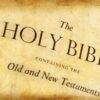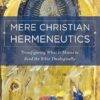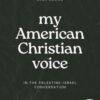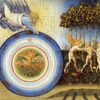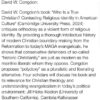Tag: “Christian
Reading the Bible as a Christian: The Outer and Inner Reality of Scripture
Scripture has an outer logic and an inner logic. Back in the day this was referred to as its outer and inner clarity (perspicuity of Scripture). In some ways the rift between the disciplines of biblical studies and systematic theology pivots on which one of these the practitioner is focused on. That is to say, the biblical studies folks, typically focus on the outer components of the text; i.e., its grammar, philology, sitz im leben (e.g., historical situadedness), composition, transmission, and other “text critical” factors. Whilst the systematic theology folks focus more on the inner-theo-logic of the text; attempting to…
KJV’s Mere Christian Hermeneutics
Just finished. As an after Barth, Torrance, Calvin, Athanasius (and patristic theology), John Webster (on Scripture) person, I would say that Kevin J. Vanhoozer’s book fits well with what us Evangelical Calvinists (after our books and my blog work) call a Dialogical Theology and reading of the text of Scripture. It is more about the encounter, transformation, and instrumentality of the reading of Holy Scripture versus the academic slicing and dicing of things; the latter often being under higher critical antisupranaturalistic pressures. This is not to say that the grammatical historical has no place, but that such a frame is…
SPPO Spotlight: A Faithful Response to Christian Nationalism
By the Rev. Erin Jones, Communications and Advocacy Engagement Manager, Lutheran Advocacy Ministry in Pennsylvania A deep exploration of the signs and dangers of Christian nationalism, and ways we as disciples of Jesus are called to confront and counter those forces, took place on March 7-8, 2025, co-hosted by Lutheran Advocacy Ministry in Pennsylvania (LAMPa), an ELCA-affiliated state public policy office (SPPO). LAMPa was delighted to co-host “Hope in a Divided World: A Faithful Response to Christian Nationalism” alongside Kindling Faith at United Lutheran Seminary at the Gettysburg Campus with nationally renowned scholars and speakers such as Dr. Lori Brandt…
My American Christian Voice
How can we use our voices for justice in Palestine and Israel as American Christians? ELCA Blogs
Maimonides on Divine Simplicity: With Christian Relief
More from the philosophy class. As I reread this just now I didn’t really answer the whole question. Although, I amended it since in the class forum. What does it mean to say that the concept of God is simple? Can this claim be held together with the claim that God has attributes? If so, how? If not, is this a problem for theism? The concept of God as simple simply entails that the God conceived of by folks like Aristotle, and Thomas Aquinas, Maimonides et al. is a Monad. I.e., a non-composite being who is not made up by…
Philosophy of Religion and Christian Theology in Combine
More thoughts on the properties of God for my philosophy of religion class. As I have been responding, this week, surrounding God’s omniscience, freedom, goodness, and necessity. These are my first two responses. “Could anyone other than you, right here and now, know what it was like to be you, right here and now? Why or why not? What are the implications of your answer for the notion of divine omniscience?” (this, posed by the tutor for the class, based on our readings of T.J. Mawson) Omniscience. Someone might have the capacity to know what it is like to be…
The Heavenly Dust: Christian Knowledge of God
As Christians we want to think about God as Christians. Christians, definitionally, aren’t profane persons. Indeed, according to Scripture, Christians are saints; i.e., set apart in Christ who is our Set Apart in the presence of the Father for us. This might seem scandalous to even recognize, but Christians are simply in a different place in regard to knowing reality as it is; insofar as the Christ (Jesus) allows us entrée in these, our bodies of death, in this in-between time. Some might want to push back and describe my observations as idealist. But it is just the opposite, in…
Who Is a True Christian? And AAR
Dr. David Congdon has written a new book. Published by Cambridge University Press (2024), it is titled: Who Is a True Christian?: Contesting Religious Identity in American Culture. I have some history with ole’ Congdon, particularly from back in the good old days of the blogosphere. Anyway, his new book might sound provocative; but I don’t think it does, really. Congdon, these days, rejects the bodily resurrection of Jesus Christ; the bodily return of Jesus Christ; a conscious afterlife (eschatological life), so on and so forth. With these identifiable positions, what in God’s green earth qualifies someone like Congdon to…
‘Our end is not a tolerable evil’: On the Concrete Christian Death
Death, just like life, in the secular and pagan realm, but even in the Christian realm, insofar as the latter mirrors the former—and it does at ubiquitous levels—is thought of in abstract and wondrous terms; indeed, in fearful terms. But for the Christian all things have been resurrected; including our dead bodies. We are now of the ‘firstborn from the dead,’ Jesus Christ. But this is to the point: when we contemplate our own mortality, which most of us attempt to hideaway from, most of us conjure some type of ethereal somethingness “out there,” that doesn’t seem real to us….
To Be Or Not To Be a Genuinely Christian Theologian
To be genuinely Christ conditioned is to be a true Christian theologian. To be a speculative theologian, that is a purely metaphysical theologian, is to go beyond the Word of God, which runs contrary to the Protestant ‘Scripture Principle,’ and a radical commitment to a Theology of the Word of God. To find a genuine Christian theologian of import in the history of interpretation is not always an easy task. There are many who claim the name of Christ—and I am not doubting their salvation in any way—but then fill up their respective theologies with straw that has been cultivated…
